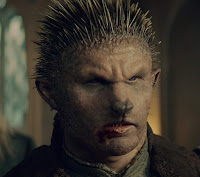Where was the story spotted?
The Witcher, season 1, episode 4 (Of Banquets, Bastards and Burials)
What happens?
 |
| Pic from here |
What's the story?
This is yet another story easily recognizable to people who are into folktales. The tale type is ATU 441, Hans My Hedgehog, named after the most famous version of the tale from the Grimm collection.
In most version of the story, a childless couple wishes for a child ("even if it's like a hedgehog", or "whatever it may look like"), and end up with a hedgehog or porcupine. The strange little creature encounters a king lost in the woods, and promises to help him in exchange for whatever first greets him when he gets home. When the king returns, he is first greeted by his only daughter. This happens two or three times with different kings, and then the hedgehog sets out to claim his prizes. The first princesses refuse to marry him (and are sometimes brutally punished), but the last one happily agrees to marry him. Marriage breaks the enchantment, the hedgehog takes off his skin, and turns into a handsome knight.
(For added weirdness factor, Hans My Hedgehog rides a rooster and plays the bagpipes.)
Variants of the story tend to differ in details. For example, the Law of Surprise does not always come into play; sometimes the hedgehog flat-out asks for the king's daughter. In other cases, he accidentally kills his first two wives who were forced to marry him, but the third falls in love with him and survives.
In the Hungarian version, the hedgehog leads a rich merchant, a king, and a poor man out of the woods. The first two promise their daughters, but the poor man doesn't have anything to give. Soon after, the hedgehog show up at his doorstep, deciding that he's going to become the man's son.
You can read the Grimm version here, a bunch of other "Hog Bridegroom" folktales here, The Pig King here, or watch a cute Hungarian cartoon version here.
Conclusion
I have a soft spot for hedgehog knights riding roosters and playing bagpipes, but I am not very fond of punishing girls for forced marriages. If I told this story, my version would probably be closer to The Witcher than the originals.











No comments:
Post a Comment